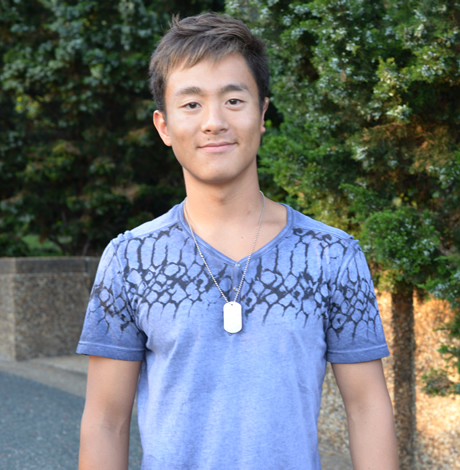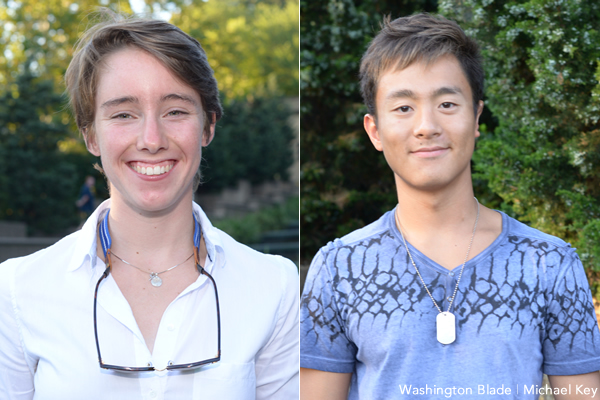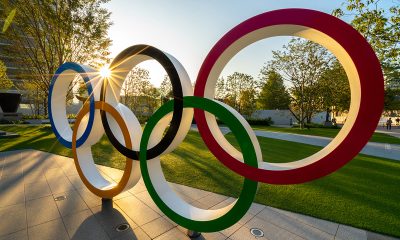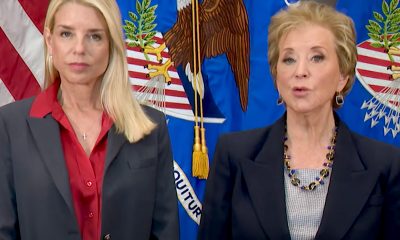Sports
Changing minds by engaging kids early
Athlete Ally takes inclusive message to schools


Kyra McClary and Sam Song have reaped the rewards of LGBT sensibility training in sports. These Team D.C. scholarship winners say coming out to their teammates was not a problem. (Washington Blade photo by Michael Key)
Track and Field runner Joanna Harper loves the rush competition brings her.
Her years on the field have taught her all about discipline, competition and hard work. However, her hard work hasn’t just been about pushing her physicality to the limit because Harper is not only an athlete but also a transgender woman.
Harper, along with other trans athletes, has faced opposition from others in her sport because she is trans. She transitioned later in life, in 2004, and was competing with other adults. These adults, she says, had a mindset against transgender athletes competing in sports that would be hard to change even if they were trained on the issue.
“There are some deeply held prejudices against transgender women,” Harper says. “Training isn’t necessarily going to change those prejudices.”
Former NCAA wrestler Hudson Taylor is trying to remake attitudes toward LGBT athletes in sports with his non-profit organization, Athlete Ally. The organization educates athletic communities on LGBT issues in sports and builds public awareness through its professional athlete ambassadors who work to advocate for the message. Taylor and other campus ambassadors travel to elementary schools, middle schools, high schools and colleges all over the country to educate on LGBT issues in sports.
Athlete Ally’s mission is aimed specifically at younger people with ambassadors giving talks to students as young as kindergarten. He says prejudices are taught at a young age and become ingrained in sports culture.
“If we’re looking at the solution in sports, the only way that we’re going to break the cycle is if we start at the very beginning,” Taylor says. “I think by educating athletes and coaches early we can hopefully be proactive and prevent some of the socialized homophobia that is a by-product of sport at an early age.”
Taylor, who served as guest editor of this special Blade sports edition, admits that explaining LGBT equality to young children is a different message than it would be talking to a college sports team. But he says the core of the message is still the same.
“There is an underlying principal of treat others as you want to be treated and don’t use hurtful demeaning language,” Taylor says. “It’s an important lesson not only for a kindergartener but even for a professional athlete.”
Taylor says that more often than not, Athlete Ally is the first LGBT sensitivity training a person has received. He says people are coming out at younger ages than ever before. LGBT people are coming out more frequently in high school and before instead of in adulthood. Taylor says that means more people have a personal connection to someone being LGBT. Despite that, athletic departments and LGBT centers on campus do not work together in the way they should, he says.
Taylor says that disconnect between athletic departments and LGBT centers is one of the reasons sports are still behind in LGBT equality.
Being both out and on a sports team is more common at a younger age than it ever has been before. Two 2015 Team D.C. Scholarship winners, Kyra McClary and Sam Song, are both out and say they haven’t encountered any issues over their sexual identity. Song is a swimmer who graduated from Poolesville High School and just completed his first year at St. Lawrence University. He says that when he came out to his team, it wasn’t a big deal.
“They were cool with it,” Song says. “It was no cause for huge panic or anything. They said, ‘That’s totally cool. It doesn’t affect the fact that you are part of the team and that what you do is important.’”
McClary says she had a similar experience.
“I think they’d all guessed,” McClary says. “We go to a really liberal school. Everyone is just like you, so no one really cares.”
McClary and Song also say their schools did not offer LGBT sensitivity training for athletes and coaches.
Still, Song thinks that having an LGBT sensitivity training course for coaches and athletes in schools would still be beneficial because of how sports culture is structured, especially when it comes to homophobic language.
“Homophobic comments are tossed around the locker room often,” Song says. “If people were at least exposed to this and were told to take it seriously and to be aware of the connotations of derogatory homophobic language, then they would be aware of what the word actually means and its not something meant to be taken lightly. It’s not meant to be used to describe an LGBT person as weak.”
Location may also have a lot to do with the need for LGBT sensitivity training in sports. McClary says she doesn’t see a real need for it in her situation because she has no plans to move to a conservative area.
“I’m planning to live in the North, “McClary says. “If I were going to live in Mississippi or something, then I would be worried.”
Athlete Ally has worked with schools in the South but Taylor says working with conservative southern schools has been more difficult.
“There are more obstacles to entry,” Taylor says. “I spent a week speaking at high schools and middle schools in Florida and a bunch of schools required every one of the kids to have their parents sign off on having me come and speak. Schools are making it a lot harder for kids to receive this message.”
It’s a message Taylor thinks is the starting point to healing other problems and fears in the country. He says that athletics have such an admired status in schools that it’s a great place to start the conversation of tolerance for not only LGBT equality but also moving toward ending sexism, racism and ableism as well.
“You go to any high school and middle school in the country and the hallways are not lined with academic trophies but athletic trophies,” Taylor says. “If we can educate our athletic population on how to be better citizens and people, how to be kind to one another, I think the ripple effect will be profound.”
Children learning these lessons and taking it with them as they grow older is a goal that Harper can get behind.
“Realistically anytime somebody is different, they’re going to stand out and they’re going to be picked on by other kids,” Harper says. “But the younger one can start with sensitivity training, the better life will be.”

More than a dozen LGBTQ athletes won medals at the Milan Cortina Winter Olympics that ended on Sunday.
Cayla Barnes, Hilary Knight, and Alex Carpenter are LGBTQ members of the U.S. women’s hockey team that won a gold medal after they defeated Canada in overtime. Knight the day before the Feb. 19 match proposed to her girlfriend, Brittany Bowe, an Olympic speed skater.
French ice dancer Guillaume Cizeron, who is gay, and his partner Laurence Fournier Beaudry won gold. American alpine skier Breezy Johnson, who is bisexual, won gold in the women’s downhill. Amber Glenn, who identifies as bisexual and pansexual, was part of the American figure skating team that won gold in the team event.
Swiss freestyle skier Mathilde Gremaud, who is in a relationship with Vali Höll, an Austrian mountain biker, won gold in women’s freeski slopestyle.
Bruce Mouat, who is the captain of the British curling team that won a silver medal, is gay. Six members of the Canadian women’s hockey team — Emily Clark, Erin Ambrose, Emerance Maschmeyer, Brianne Jenner, Laura Stacey, and Marie-Philip Poulin — that won silver are LGBTQ.
Swedish freestyle skier Sandra Naeslund, who is a lesbian, won a bronze medal in ski cross.
Belgian speed skater Tineke den Dulk, who is bisexual, was part of her country’s mixed 2000-meter relay that won bronze. Canadian ice dancer Paul Poirier, who is gay, and his partner, Piper Gilles, won bronze.
Laura Zimmermann, who is queer, is a member of the Swiss women’s hockey team that won bronze when they defeated Sweden.
Outsports.com notes all of the LGBTQ Olympians who competed at the games and who medaled.
Sports
US wins Olympic gold medal in women’s hockey
Team captain Hilary Knight proposed to girlfriend on Wednesday

The U.S. women’s hockey team on Thursday won a gold medal at the Milan Cortina Winter Olympics.
Team USA defeated Canada 2-1 in overtime. The game took place a day after Team USA captain Hilary Knight proposed to her girlfriend, Brittany Bowe, an Olympic speed skater.
Cayla Barnes and Alex Carpenter — Knight’s teammates — are also LGBTQ. They are among the more than 40 openly LGBTQ athletes who are competing in the games.
The Olympics will end on Sunday.
Sports
Attitude! French ice dancers nail ‘Vogue’ routine
Cizeron and Fournier Beaudry strike a pose in memorable Olympics performance

Madonna’s presence is being felt at the Olympic Games in Italy.
Guillaume Cizeron and his rhythm ice dancing partner Laurence Fournier Beaudry of France performed a flawless skate to Madonna’s “Vogue” and “Rescue Me” on Monday.
The duo scored an impressive 90.18 for their effort, the best score of the night.
“We’ve been working hard the whole season to get over 90, so it was nice to see the score on the screen,” Fournier Beaudry told Olympics.com. “But first of all, just coming out off the ice, we were very happy about what we delivered and the pleasure we had out there. With the energy of the crowd, it was really amazing.”
Watch the routine on YouTube here.




















